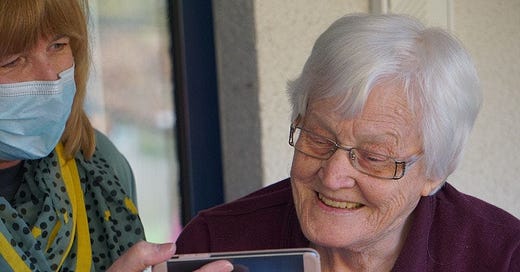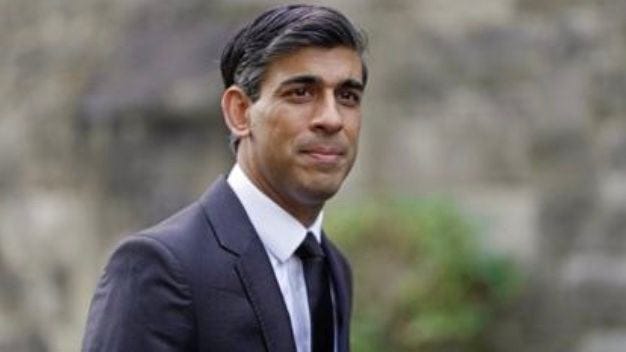Spreading the costs fairly
This week's edition comes back to the cost of living crisis and examines a few facets of the debate about the fairest way to spread the costs across society.
Welcome to the fourth edition of Fair Comment.
This week's edition comes back to the cost of living crisis and examines a few facets of the debate about the fairest way to spread the costs across society. Some of these costs have only recently come into view because of inflation and rising wholesale energy prices; others have been bubbling away unaddressed for years, including social care (and let’s not forget the housing market - more on that in future editions).
If you have any comments on how we can improve and develop this newsletter, please contact me directly on will@fairnessfoundation.com.
To find out more about us, please visit fairnessfoundation.com.
Thanks and best wishes,
Will Snell
Chief Executive Fairness Foundation
PS: if you haven’t yet done so, please sign up to get Fair Comment in your inbox every Monday.
Funding social care
Increasing national insurance is not the fairest approach
It looks increasingly unlikely that the government will U-turn on their plan to increase national insurance to support the NHS and social care, after Boris Johnson and Rishi Sunak took the unusual step of publishing a joint article in yesterday’s Sunday Times to affirm their commitment to it (see this BBC article). This is despite opposition from many MPs in their own party who argue that the cost of living crisis makes it hard for families to pay more in tax. Of course, they are right that it’s unfair that people facing rising costs of living are asked to contribute more when many others are not; but arguing for lower taxes in general is not the solution. Instead, the government could consider a range of alternatives that would share the costs more fairly. A good example would be to tax income from wealth at the same rate as income from work (as argued by the Trades Union Congress and many others).
Financial relief for the cost of living
Government plans would benefit the better off
The Institute for Public Policy Research has claimed that Rishi Sunak’s plans for offsetting soaring energy bills would leave behind five million of the UK's poorest people while handing a tax break to a quarter of top earners. The plans being considered involve giving council tax relief to people with properties in band A to C, as part of a wider package of measures. The IPPR has pointed out that 40% of beneficiaries of this policy would have above-average incomes, including people with expensive houses in the south-east of England, and that 25% of the highest earners would have their council tax reduced. Meanwhile, five million of the poorest people in society would not benefit at all from the plans.
Chart of the week
The wealth gap
OK, it’s an infographic, not a chart. But it is definitely worthy of inclusion here. It’s also very long, so this is just the first of three sections - the full version is on the Open University website. It was produced as part of a BBC documentary (see ‘reads of the week’ below).
Poll of the week
What’s the fairest way to fund social care?
Apologies in advance, but there are nine options. You have to work hard at this one. Here’s a helpful primer from the Nuffield Trust on the pros and cons of each option. Everyone who does the legwork and votes in the poll gets a free biscuit (self-funded).
Last week we asked for your views on whether the government is doing enough to tackle poverty in Britain. Perhaps unsurprisingly, most of you thought not - in fact, 100%...
Reads of the week
Alfie Stirling at the New Economics Foundation points out that, regardless of the debate about national insurance rises, 1.3 million people are missing out on £7,300 per year in Universal Credit payments that they're already entitled to, and proposes a range of reforms.
The Institute of Fiscal Studies outline the labour market effects of the increase in the state pension age from 65 to 66, pointing out that in more deprived areas of the country, many people without a state pension cannot afford to retire.
The Fawcett Society has published its 2022 Sex and Power Index, a biennial report which charts the progress towards equal representation for women in top jobs across the UK. It finds that “the pace of change is glacial in the majority of sectors and... women are outnumbered by men 2:1 in positions of power. Women of colour are vastly under-represented at the highest levels of many sectors.”
Larry Elliott writes in The Guardian about the success of the food writer and activist Jack Monroe’s campaign to raise awareness of the soaring costs of basic foodstuffs, which has led the Office for National Statistics to change the way it looks at the impact of inflation on different income groups.
Joanna Kostka highlights in The Conversation how Gypsy, Roma and Traveller children face discrimination across Europe and the UK.
Paul Lee writes in his Sense of Fairness blog about Fair Play, the play – and the mistreatment of Caster Semenya.
More of a watch than a read, but the BBC broadcast an interesting documentary on wealth inequality last Tuesday, The Decade the Rich Won. It’s a two-parter with the second episode out tomorrow evening. There’s an accompanying article on the BBC News website, as well as a page on the Open University website (see chart of the week, above).
Fairness Foundation updates
Last week a joint op-ed by yours truly and John Penrose MP was published in the Times Red Box, arguing that levelling up has to focus on dismantling the structural barriers to equality of opportunity, including by tackling poverty and inequality. You can read the article on the Times website or on our website.
Our next joint event with the Policy Institute at King’s College London is on 23 February at 5pm. This online event looks at social mobility, with a range of speakers (including the author) discussing Professor Selina Todd’s new book, Snakes and Ladders: The Great British Social Mobility Myth. More information on our website.
If you’re looking for a challenge, you’ve got about eleven hours to apply for the role of Head of Communications at the Fairness Foundation! Applications close at midnight tonight. It’s a fantastic role with huge potential, and you can be based anywhere in the UK. Find out more on our website.










